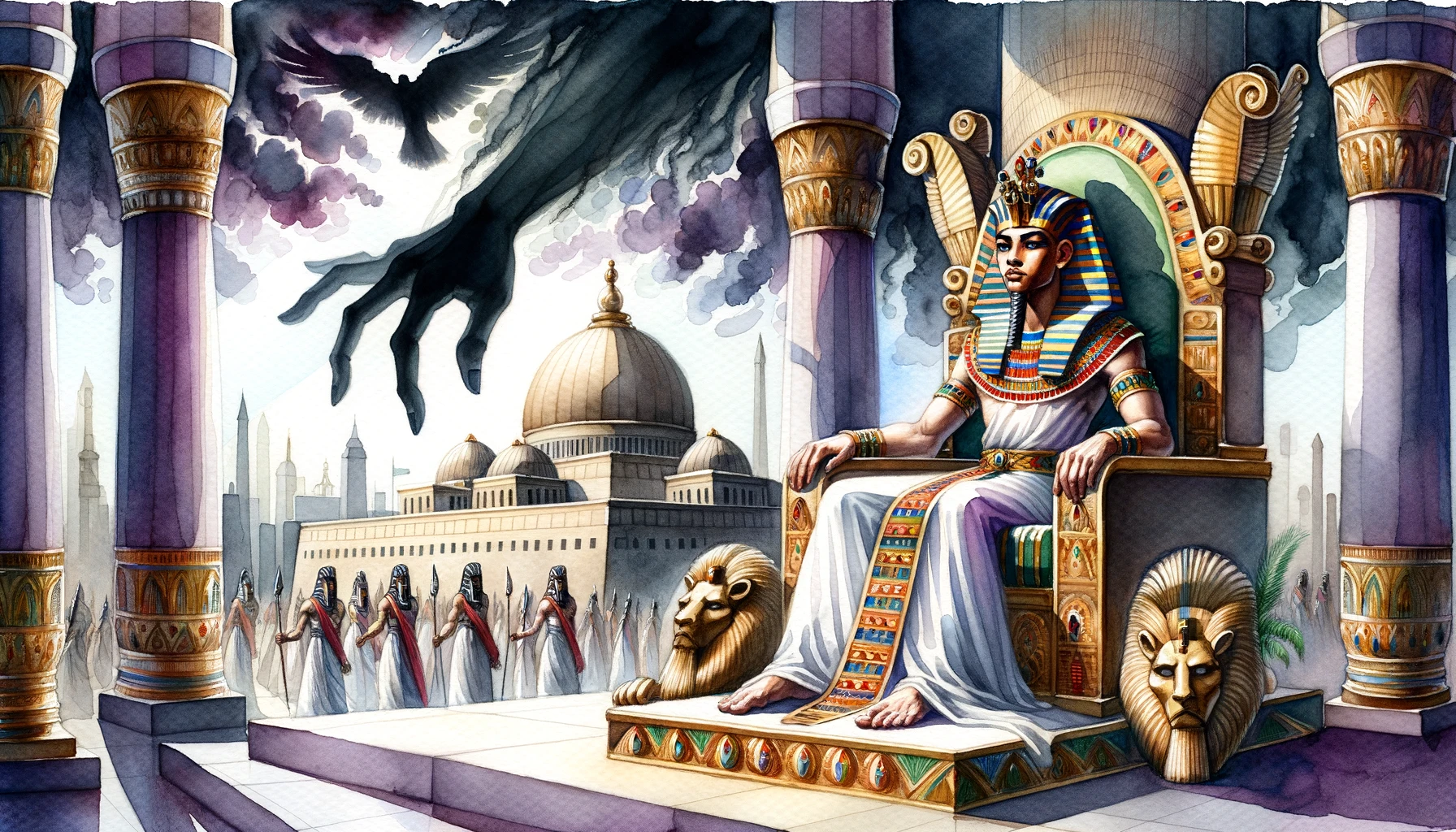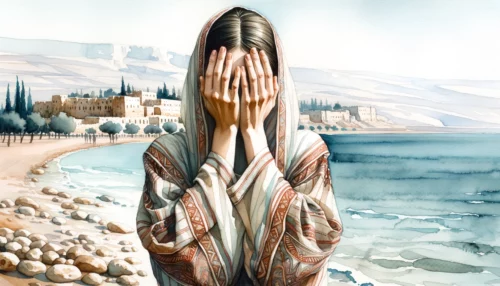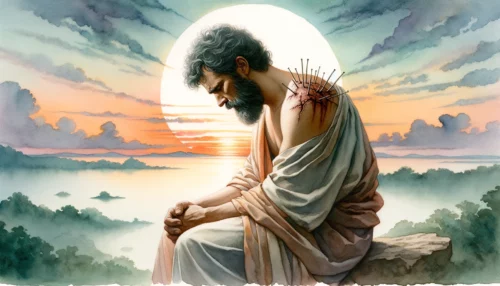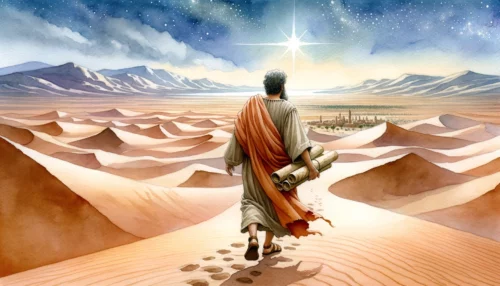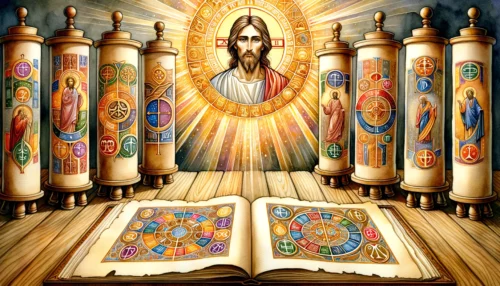The account of Pharaoh’s hardened heart, found in the book of Exodus, is a narrative imbued with profound theological implications. This tale of defiance and consequence, ultimately leading to the liberation of the Israelites, unveils intricate layers of God’s nature and the human capacity for stubbornness and rebellion. As we navigate this complex story, we aim to shed light on the issue at hand: Why did God harden Pharaoh’s heart?
The Biblical Account: A Closer Look at Pharaoh’s Hardened Heart
Unfolding in the Book of Exodus is an intense narrative centered around Pharaoh, the ruler of Egypt, and the Israelites enslaved in his land. The story gains momentum with the entrance of Moses, a man chosen by God to lead the Israelites to freedom. God arms Moses with a demand for Pharaoh: “Let my people go” (Exodus 5:1). A simple enough request, and yet, one met with defiance, refusal, and a hardened heart.
From this refusal arises the question we are exploring: Why did God harden Pharaoh’s heart? The concept first appears in Exodus 4:21 when God informs Moses about his plan to harden Pharaoh’s heart to resist Moses’ plea, which would culminate in a display of divine power through a series of devastating plagues upon Egypt. The narrative clearly outlines that God had a purpose behind this decision, as it was an orchestrated move to demonstrate His mighty power (Exodus 9:16).
There is a distinct progression in the narrative, as we observe a shift in the text. Initially, we read of Pharaoh hardening his own heart (Exodus 8:15, 8:32, 9:34). In these instances, Pharaoh, after experiencing a temporary relief from the plagues, decides to break his promise to Moses, reinforcing his own heart’s stubbornness. Following this, the scripture indicates God hardening Pharaoh’s heart (Exodus 9:12, 10:1, 10:20, 10:27, 11:10, 14:8). This shift is significant and implies a divine intervention.
The narrative also reveals the nature of God’s judgment upon Pharaoh’s hardened heart. Each act of rebellion by Pharaoh is met with an escalating series of plagues, moving from the annoyance of frogs and gnats to the devastation of livestock death, boils, hail, darkness, and ultimately, the death of the firstborn. The escalation in plagues represents God’s response to Pharaoh’s self-induced hardening, leading to a divine hardening as the ultimate judgment.
The biblical account of Pharaoh’s hardened heart reveals a complex interplay of human stubbornness and divine intervention. The story begins with Pharaoh hardening his own heart against God’s demand to free the Israelites, followed by a shift where God hardens Pharaoh’s heart, leading to an escalating series of plagues. This progressive hardening serves a dual purpose: it’s a judgment on Pharaoh’s initial act of rebellion and a manifestation of God’s power.
Divine Sovereignty vs Human Free Will: Striking a Balance
Engaging with the narrative of Pharaoh’s hardened heart, we must recognize an underlying tension between divine sovereignty and human free will. The Christian faith holds these two realities in balance, acknowledging that while God is all-powerful and in control of everything, humans are also endowed with the ability to make choices.
Within this framework, let’s revisit the tale of Pharaoh. God’s foreknowledge of Pharaoh’s decisions is evident from the start (Exodus 3:19). God, in His omniscience, knew Pharaoh would resist Moses’ demands and would not easily let the Israelites go. This knowledge, however, didn’t infringe on Pharaoh’s freedom to make decisions. Pharaoh’s initial decisions to harden his heart were his own, which displays an exercise of his free will.
On the flip side, we must also acknowledge God’s role in hardening Pharaoh’s heart, as explicitly stated in the text (Exodus 9:12, 10:1, 10:20, 10:27, 11:10, 14:8). The key to understanding this is appreciating God’s sovereignty – His authority to carry out His perfect will. This sovereignty doesn’t deny or undermine human free will but works in and through it.
An interesting concept to consider is the principle of concurrence, a doctrine that explains how God works through human actions to fulfill His will. God, in His divine sovereignty, can work through and even use the stubbornness of Pharaoh to display His power and deliver His people. This divine orchestration doesn’t negate Pharaoh’s responsibility for his own decisions. Instead, it demonstrates how God can turn even human rebellion into an opportunity to reveal His glory.
Engaging with this theme of divine sovereignty and human free will leads us to understand God’s justice. God is not unjust in hardening Pharaoh’s heart. Rather, God’s actions are a response to Pharaoh’s initial self-hardening and rebellion. God, in His righteousness, uses Pharaoh’s defiance to manifest His power, thereby revealing His nature to the Israelites and to all of Egypt.
The tension between divine sovereignty and human free will is a significant theme in the narrative of Pharaoh’s hardened heart. God’s foreknowledge of Pharaoh’s decisions does not infringe on Pharaoh’s freedom to choose. However, God, in His sovereignty, intervenes to harden Pharaoh’s heart after Pharaoh’s initial acts of defiance. This illustrates the doctrine of concurrence, where God works through human actions to fulfill His will, revealing His power and justice.
The Message in the Narrative: Lessons from Pharaoh’s Tale
In the story of Pharaoh and his hardened heart, there are several valuable lessons for us. Each lesson is drawn from the nature of God and His relationship with humanity as illustrated in this dramatic narrative.
Central to this story is the idea of God’s supremacy. Through the ten plagues inflicted on Egypt, God shows His overwhelming power, not just to the Israelites but to the Egyptians as well. Every plague undermines an Egyptian god (Exodus 7-12). The plagues serve as a reminder that God’s power is unrivaled, that He stands supreme above all false gods, and that no entity, Pharaoh included, can contest His divine authority.
We encounter the concept of God’s justice and righteousness. As God hardens Pharaoh’s heart in response to Pharaoh’s own self-hardening and rebellion, we witness divine justice in action. God, being just, allows Pharaoh to continue in his chosen path of stubbornness, culminating in the devastating consequences that Egypt faces. This sequence serves as a powerful example of the consequences of sin and disobedience to God.
This story underscores the power of faith and obedience. Moses, a humble shepherd, is selected by God to stand before the most powerful ruler of the time and demand the release of the Israelites. Despite his initial hesitations (Exodus 3:11, 4:10), Moses demonstrates immense faith and obedience in God’s plan. His faithfulness stands in stark contrast to Pharaoh’s rebelliousness, emphasizing the blessings that accompany obedience and the consequences of defiance.
The narrative of Pharaoh’s hardened heart accentuates the profound mercy and patience of God. Despite Pharaoh’s repeated defiance and God’s foreknowledge of it, God allows Pharaoh multiple opportunities to change his decision (Exodus 7-10). This element of the story underscores God’s patience and His desire for repentance rather than punishment.
In the narrative of Pharaoh’s hardened heart, we find key lessons about God’s supremacy, justice, and mercy, as well as the power of faith and obedience. The story underscores God’s unrivaled power, highlights His justice in response to Pharaoh’s defiance, and accentuates the contrasting outcomes of obedience and rebellion. Through the repeated opportunities given to Pharaoh, we witness God’s profound mercy and patience.
Navigating the Depths of Divine Wisdom
The story of Pharaoh and his hardened heart, as depicted in the Book of Exodus, invites us to appreciate the multifaceted character of God and His perfect sovereignty. In the interplay between God’s divine omnipotence and human free will, we learn about the balance between God’s righteous judgment and His mercy. Through the narrative, we see God’s power at work, manifesting in ways that challenge and overturn worldly power structures.
- How does the story of Pharaoh’s hardened heart influence your perspective on the balance between God’s sovereignty and human free will?
- How might the lessons from Pharaoh’s narrative help to shape your understanding of obedience and defiance in your personal life?
- In what ways does the story inspire you to trust in God’s sovereignty and justice, even in situations that appear dire?
God’s narratives are not just tales from the past, but timeless lessons that shape our faith and guide us on our path. May you find courage and wisdom in these biblical accounts, fueling your faith and bringing you closer to understanding God’s incomprehensible wisdom and unfathomable love. Remember, His ways are not our ways, and in this divine difference, we find our faith affirmed, strengthened, and secured.




